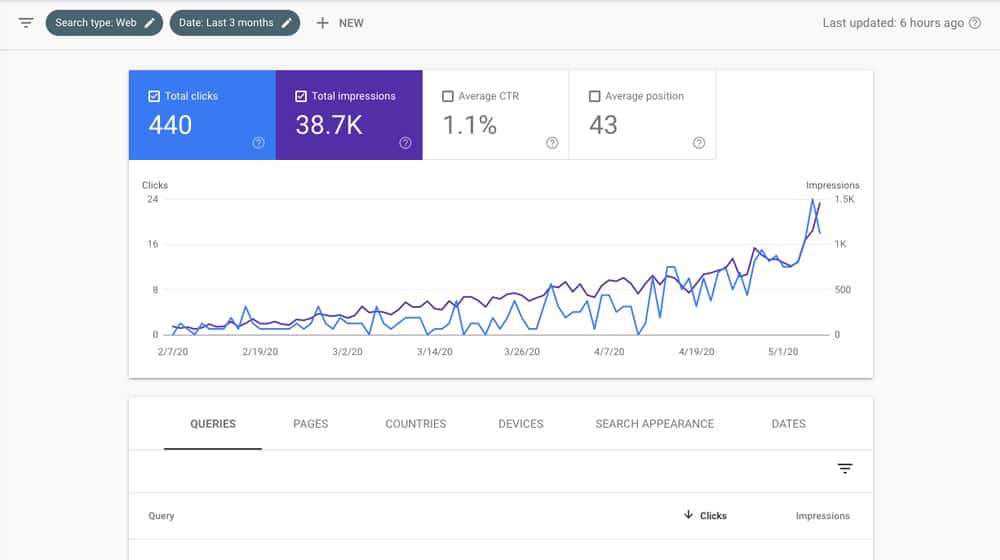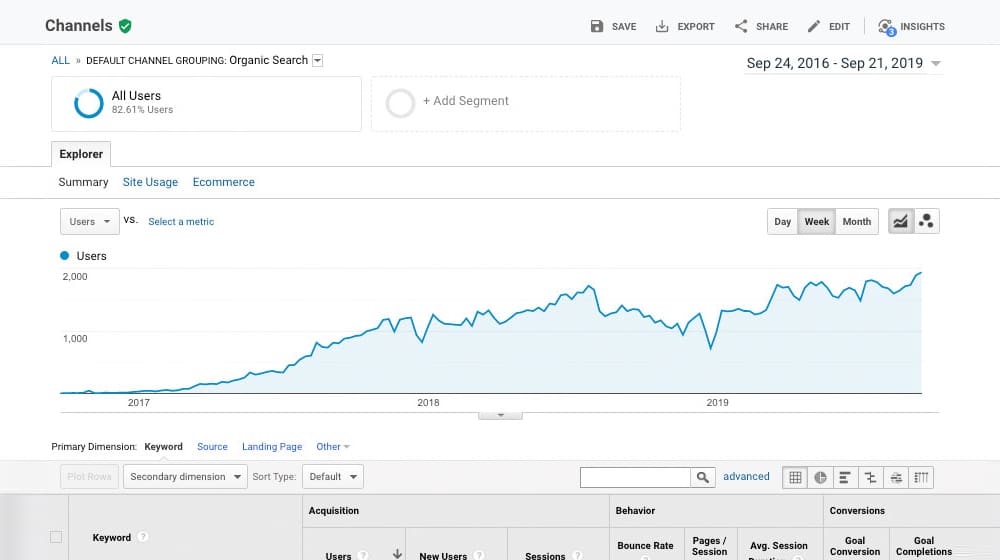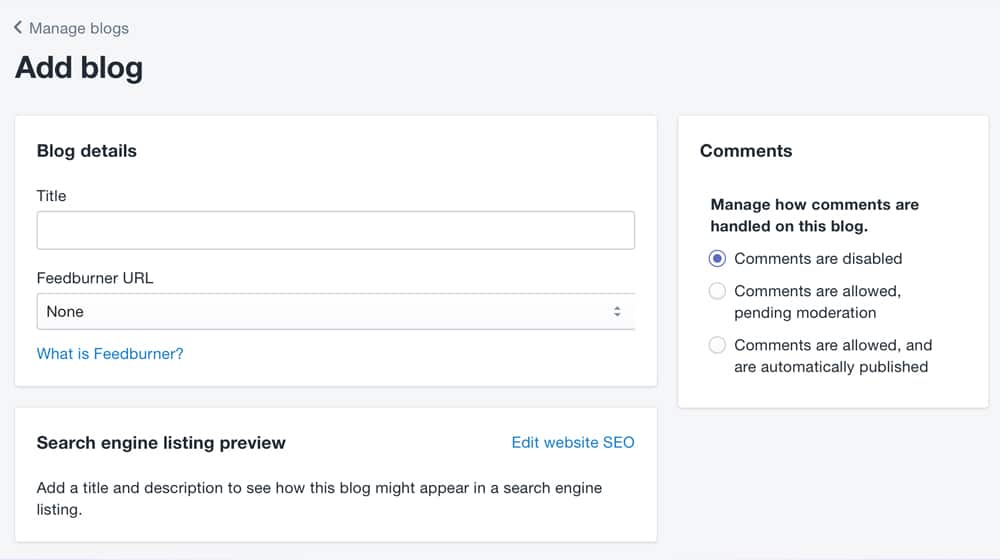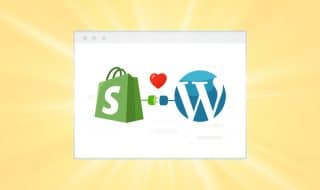Is Blogging Worth It For Your Shopify eCommerce Store?

I frequently talk about how blogging is basically essential for a modern online business to thrive. Content is how search engines like Google find and promote your site, and it's how people who use those search engines discover your brand.
Setting up a business on Shopify is pretty easy; the framework is simple, the apps are robust, and the entire setup process doesn't take very long at all. You can even run a blog natively on the Shopify platform, without needing to set up WordPress and fuss around with dual architectures.
The question is, is a blog on a Shopify store worthwhile, or is it going to be a waste of your time? Let's look at the issue from a few different angles.
Where Effort Goes the Furthest
If you're considering the merits of running a blog, you're in one of a few situations. You might be starting a business and are facing the decision of whether or not to start your own blog. You might have been running a business for a while and you're wondering if a blog is the right next step. You might also have been running a blog for a while, and you're wondering if it's worth the continued time and effort.
The calculation you need to make here is where your effort is best spent. Running a blog is undeniably beneficial for pretty much every business, but it's also going to eat up a lot of time, resources, and potentially money, depending on how you choose to manage it.
You only have so many hours and so much energy in a given day. Where you spend that energy is a very important decision, especially when you're starting a new business, and when blogging can take months or even years to pay off.
For example, let's say you spend three hours a day working on blog posts. That's three hours you're not spending on developing new products, making sales calls, performing link building outreach, optimizing paid advertising, or promoting yourself on social media.

You have to ask yourself: will putting that effort into a blog be the best use of that time and energy, or would your business be better off if you were to focus on some of those other marketing strategies instead?
This is a very difficult question to answer, and depends on the size of your company, budget, patience, cost of goods, profit margins, competition, whether or not you regularly sell to people outside of your city or state, and your overall knowledge of content marketing.
You essentially need to calculate the expected value of each of those actions and compare them.
The trouble is, each of those expenditures has a different calculation for how valuable it can be. Writing a blog post might not be an immediate value; in fact, it's entirely possible that none of your blog posts will ever be responsible for any significant amount of traffic, sales, or brand awareness. Blogging is something that compounds over time. One post usually won't make a huge difference, but 1-2 posts per week for a year can be the difference between a business barely breaking even and a thriving company.

I always recommend building a blog, of course, but there are often more important things to focus your energy on. If you have the choice between, say, offering a new product on your store, or writing a new blog post, chances are the new product is going to be a better investment, at least in the short term.
What Purpose Would Your Blog Serve?
Blogs are "essential" for business, but how? Why? They need to serve a purpose, which means you need to put the thought into it to figure out what that purpose is, and direct your blogging efforts towards that purpose.
Does your blog exist to build awareness of your brand? If that's your goal, you need to focus your content on a narrow range of topics centered around your brand, the problems your products solve, and the ways your products solve those problems. Many such blogs tend to write comparison articles between their product and their competitors, for example, and tutorials about common issues that you know how to solve.
Does your blog exist to teach users about your products? This takes the education perspective from the previous section and expands upon it. You might write usage guides, tutorials for solving common problems, and Q&A posts about your products. The risk here is that your content could become too sales-focused and turn away users, and could even run the risk of having search engine algorithms determine that your content is biased sales copy, which would surely impact it's search visibility.
Does your blog exist to provide information about your industry? Becoming an educational blog, a news blog in your niche, or a thought leadership blog can be a great way to grow a brand, but it tends to be one of the most time and resource-intensive ways to run a blog. News posts, in particular, require being very reactive and proactive in your niche, writing with a very quick turnaround, and constantly keeping up to date lest you fall into irrelevance.
Does your blog exist to draw in links to improve your site's overall visibility? This is one of the best ways to grow a business, but it requires a deep investment into high-quality content.
Are You a Good Writer?
In the world of blogging, there are two kinds of people. There are the people who love to write, who are good at writing, and who would prefer to run a blog rather than a business. Then there are the people who are business-savvy, who love the technical aspects of running a business and the social aspects of making sales calls, but who have a hard time writing in long forms like blogs. Then there are, of course, individuals who find themselves in both columns.
The first group of people doesn't tend to have a hard time keeping a blog going, though it's another matter entirely whether they spend the time on things like keyword research, content marketing, or promotion. There are thousands of people out there running monetized blogs that get little or no traffic because they aren't business people and they don't know how to sell themselves.

The second group of people loves building and running businesses, but the whole "blogging" thing tends to escape them. They know common advice is that they need to, but when it comes down to writing blog posts, they're short, they're disjointed, and they're often too focused on sales to make good content.

Plenty of people are hybrids; they skew one way or another but sit somewhere in the middle between these two extremes. Often, though, the solution is for the owner of the business to hire someone on the other side of the coin.
This is an interesting distinction to make. Blogging itself is almost always worth the effort when done properly, but it might not be worth your effort. This is why you might consider not writing (or running a blog) yourself, but rather hiring writers, blog managers, or content marketing companies.
Of course, you run into a different problem here, and that's the problem of money. It costs money to hire someone to manage your blog for you, and in most situations, your blog manager is not going to be the same person as your writer. If your business is running on thin margins, drawing on savings to keep it going, or simply not doing a lot of business yet, funding a blog can be a tall order. For some smaller or newer businesses, a long-term investment like that can put a strain on their finances.
The benefit here is that it frees up your time to make those sales calls, optimize those ads, and build that brand awareness on your own time. Ideally, you make back the money you spent on blogging through the combination of your own outreach efforts and the return on investment of the blog itself.
When a blog is ran properly, it's an investment that yields dividends for years to come, as you own the content that you're producing and permanently growing the overall size and reach of your website.
The Primary Benefits of a Shopify Blog
You get more out of a blog than might be obvious at first glance. What are the main benefits of running a blog off your Shopify store?
The first is traffic. The main reason most businesses make a blog is to rank in Google and other search engines, which attracts people to your site. Many of these people would have no idea you existed if not for the blog posts that show up when they're searching for topics you happen to have written about.

Of course, this takes quite a bit of time to come to fruition. There are a lot of websites out there with a ton of existing clout and momentum. Trying to compete with them or even out-perform them is a tall order, and it can take years to get to a point where you're listed among them. That's the whole point of content marketing, though; to implement strategies that do that, eventually.
The second benefit is that a blog builds trust. It's so easy to set up a Shopify store (it's built in, after all, and almost every Shopify site has one), that a lot of people might not trust some random storefront they've never heard of before. If you have a blog, they can check it out and get some impression of your brand.
What might they be looking for? At first glance, they want to see the simple things. Is your blog content well written, or does it look like it was bought for $1 per 500 words from an ESL content mill? Does it cover relevant topics, or is it random nonsense or spun content? Is it unique, or does it bear a strange and striking resemblance to the content found on your biggest competitor? Was the last time they published back in 2017, and are they still in business, or are they producing useful content regularly?

Once they recognize that your blog is not terrible, they start to read and learn from your free content. They look to see if the advice you're giving is correct, if the data and the conclusions you draw seem accurate, and if you're working through the reasoning for the arguments you make.
Most people don't do much or any of this consciously. Many might not even read your blog; they'll just inherently trust your site more if you have a blog. It's actually a sign of trustworthiness. In fact, around 70% of consumers think that a blog adds credibility to a business.
Should You Blog Using Shopify?
Another question you have to answer before you can really get down to the business of blogging is how you want to run that blog. Do you want to use the built-in Shopify blogging system, or do you want to use WordPress?
First of all, using Shopify is very simple. If you have a Shopify site with a shop set up, it's a matter of a couple of clicks to add a blog to it. You can be up and running in a matter of minutes. WordPress takes considerably more time to get up and running when you're using Shopify as your base.

WordPress has the benefit of being more flexible in terms of the sheer number of plugins and added functions available to you, though of course, that complexity isn't always a good thing. The more options you have, the harder it can be to choose between them. If you're a power user and you're used to tweaking minute settings to get the best results out of complex systems, WordPress is the ideal platform to use. If you just want the broad strokes of a blog up and running, basic SEO control, and a moderate level of features, a Shopify blog is just fine.
Another benefit of Shopify blogs is that, since they're built directly into your Shopify store, they share the same theme and design as your storefront. It's all directly integrated, and you don't have to worry about finding a comparable theme on WordPress or customizing one or the other to match. It's ready to go out of the box.
If you're new to blogging or new to running an online business in the first place, I would say that using Shopify's blogging system is just fine for most of your needs. You can always change a few years down the road when you outgrow the basic introductory level features and want more advanced control, but honestly, moving to WordPress if you're already on Shopify isn't really worth the hassle. If you're interested why I came to that conclusion and want to read more on this, I wrote a full post on that topic here.
Is Blogging Worth It?
I will never tell you that blogging isn't worthwhile. There are very, very few businesses out there that wouldn't benefit from a blog, and those businesses tend to be very niche and have already built up just about the largest networks they can.
The decision you have to make is this: is now the time for you to start a blog, or are there better things for you to focus on before you get it going? If you were running a website on another platform and didn't have a mobile responsive design, for example, I would say that getting mobile compatibility up and running is more important. That's not applicable to Shopify, which is by default responsive these days, but you get the idea.
Once you've reached the point where the next best thing you can do is to grow your site and start a blog, you have to decide if it's something you can do on your own, or if you need to hire someone to help you. This means you need to take a good look at the quality level of your writing, how long it takes you to write posts, and how much effort you're willing to put into the blog. If you take more time than it's worth, it might be a better idea to hire a writer, a blog manager, or a content marketing company.
Content is worthwhile for every business, so the only question is, how will you have yours produced?










August 26, 2020
I agree that not all e-comms should have a blog since some of us are still small and just starting out. When the business is established and finances are stable, then having a blog might be worth considering.
August 30, 2020
Hey Fabio! I think most all eCommerce sites should have a blog, even if you aren't posting to it very often yet. Your attention and time when you're first starting out has to be used very wisely, and creating great products and a positive store experience is priority number one.
If your store is already set up and you're looking to increase your sales and website traffic, this is when blogging starts to make more sense.
Blogging is a long term strategy though and will take some time to pay off, if you have the patience for it.
I wrote an article on that here: https://www.contentpowered.com/blog/blog-start-getting-traffic/
August 27, 2020
I moved my ecommerce from WordPress to Shopify. It is the best decision I did since Shopify is more tailored to an online shop. The blogging feature on Shopify is spot on especially that I am running a board game store. People read my personal reviews, features and news in the board game world. It increased my presence locally and sales went up as more and more people knew about the benefits of playing board games as nowadays we are encouraged to stay indoors.
August 30, 2020
Hey Phil! Absolutely, it's tough to beat Shopify when it comes to eCommerce, I much prefer it to a WordPress store. I think the blog platform on Shopify leaves a lot to be desired, it's nowhere close to WordPress in my opinion, so you'll have a tougher time competing with WordPress sites that are faster, better organized, and have better functionality. As long as your content on Shopify is top notch, you can still run a very successful and profitable site. I've seen a handful of Shopify sites that hired developers to extend some custom functionality to their blog, so that's an option as well in the future. It's tough because I love Shopify for eCommerce and WordPress for blogging, I wish there was a way to get them to play nice together! I will keep dreaming that it happens someday... 😉
August 31, 2020
This is helpful! I've been considering adding a blog to my store. My problem is I am not really a writer and I have doubts about hiring a writer or a blog manager to work for me as I don't have any experience hiring people. Do you think if I invest in a blog company to handle this for me it will be worth it?
September 01, 2020
Hi William!
I always tell my clients, I consider blogging to be intermediate / advanced level marketing. It's ideal for seasoned marketers, businesses with strong cash flow and steady hands, or companies who want to diversify their marketing efforts. It is a bold strategy to start an online business with a strong content marketing strategy, but it's also one that can pay some serious dividends in the long run. The issue is most people quit before they see any results. You should commit to at least a year of regularly publishing high quality content that has the potential compete. That's tough for many brand new businesses to handle, so something like pay per click ads or other fast-acting marketing strategies may be better to get them off their feet.
There's a lot of other factors to consider. Do you ship nationwide, or worldwide? Is your product a niche product, or is it attractive to a wide audience? How competitive is your industry? How much authority does your website have? These things can influence a content marketing campaign and make it more challenging to succeed (or much simpler).
I wrote a good guide here on the subject - it's written specifically for business owners who are considering promoting their business through their blog, the benefits of doing so, and what to expect. You may find it helpful.
If you ever have questions, please drop me an email! I'm an open book 🙂
November 04, 2020
Interesting take. I'm just starting my business so I don't think its right for me now but its good to know I have that option in my back pocket.
November 09, 2020
Hey Daniel! If you're not a blogger yourself, paying someone to write your posts when you're first starting your store may be too much of a drain on your budget in those first months. When your store is all set up and you're ready to get some sales, keep blogging in mind. On just about every guide on the web about how to promote a Shopify store, you'll see blogging is toward the top of those lists. It sounds like you have the right idea!
January 14, 2021
I ran a custom site at first but I couldn't keep up with the cost of all of my plugins, server, subscriptions, etc. So I transferred my site to Shopify. It's been there for quite a while now and growing a blog on my Shopify store is one of the best decisions I made.
January 14, 2021
Hi Elida!
Thanks for sharing with us.
That certainly is one of the perks of Shopify - simplification.
Of course, many of those subscriptions that you managed to drop will find their way back to you. Nearly every app on Shopify is subscription-based 😛
Happy to hear your site and your blog are both working out for you. Keep it up!
March 02, 2021
I have a Shopify blog before but I stop it since I have no time to take care of it. I realized then that it's not easy to manage a blog. Just thinking of the content for it already eats most of my time. Now I am thinking of hiring someone to do it for me. Do you think just reviving my old blog is okay or better create a new one?
March 04, 2021
Hey Damian!
We wrote a couple of articles on this subject that I think would be helpful to you:
https://www.contentpowered.com/blog/improving-seo-old-website/
https://www.contentpowered.com/blog/update-old-blog-seo/
I think it's a good idea to review what you already have and scrap any posts that aren't indexed or haven't performed.
I wouldn't recommend starting an entirely new blog, but an audit is never a bad idea, especially if it's been a while since you've written any content for your site.
I hope this helps!
June 07, 2021
Hi James,
I started blogging for my Shopify blog but I can't find my RSS feed. Is there something I'm missing?
Respectfully,
Michael
June 07, 2021
Hi Michael!
For some reason, RSS feeds aren't native to Shopify blogs.
I've used the "Smart RSS Feed" app on a few of my client's sites who needed them.
It's not perfect but it works fairly well.
Hope this helps!
July 15, 2021
Alright, you've convinced me! Time to fire up my blog.
July 15, 2021
Hey John, smart move!
I wrote an article on improving the default Shopify blog here, if you're interested:
https://www.contentpowered.com/blog/apps-improve-shopify-blog/
December 13, 2021
This is something I've been mulling over lately. I think our business could use the traffic but while I do think I can write fairly well, there are bigger priorities I need to focus on. I might consider hiring a writer though. Is hiring freelancers the best approach when you're just starting out the blog? Or is it better to invest in a content marketing company right off the bat?
December 22, 2021
Hi Paulo!
For most, it's a matter of budget.
A lot can go wrong when hiring freelancers, and you'll also have to hire somebody else to do SEO, topic research, editing, graphic design, and so on.
They are cheaper, though, and tend to be a popular option for people just starting out.
Agencies take care of all of that for you and ensure it's done right.
You'll have to find one that knows what they're doing, but when you do, your dollars per results will usually end up being better in the long run.
I wrote a good post on this subject here, if you're interested in reading more! https://www.contentpowered.com/blog/content-marketing-cost-business/
April 11, 2022
Thanks for sharing these details very helpful for us.
April 12, 2022
You're welcome, Cyrus!